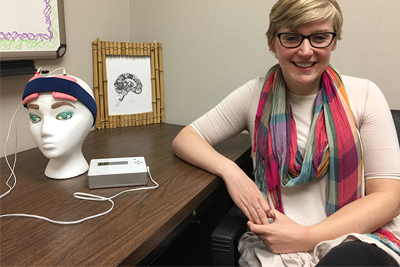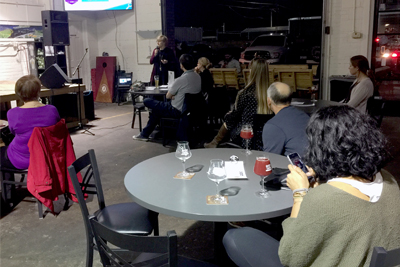The last time that afternoon snack craving hit, what choice did you make? Did you reach for an apple or the bag of Doritos in the office common area?
Many of us could make better eating choices, but for individuals who struggle to manage their weight, these choices are essential for their health. Unfortunately, 30 percent to 40 percent of U.S. adults are classified as obese. Many of these people have great difficulty changing their eating habits and their unhealthy eating behaviors lead to other chronic diseases like diabetes, heart disease and cancer. In short, unhealthy eating choices are slowly killing them.
 So, why don’t those of us who struggle with weight management choose to become more health conscious?
So, why don’t those of us who struggle with weight management choose to become more health conscious?
Mary Katherine Ray, a Ph.D. candidate in the Behavioral Neuroscience Program within the Psychology Department at UAB, said that for some people these choices are influenced by psychological behaviors that are difficult to control like impulsivity.
Impulsivity is a psychological concept that relates to actions people take with little consideration of consequences. Impulsive behaviors may be associated with food cravings, overeating and poor food choices. This means that poor dietary habits may not be the problem, but instead the behaviors underlying food choices. So, where do we turn for help when we need advice on how to sustain healthier eating behaviors?
Ray said it is certainly not media advertisements that suggest radical weight loss in a matter of days.
“These weight loss scams are not effective, do not fix underlying behaviors and ultimately discourage people,” she said.
The good news is Ray and her colleagues at UAB are hard at work to help people struggling with diet and weight loss. They are using a technique called transcranial direct current stimulation, or tDCS, to actually change people’s eating behaviors. Transcranial means passing through the skull and direct stimulation involves applying a small current (equal to two 9-volt batteries). This technique is completely noninvasive and safe for the user.
The idea is to stimulate the front region of the brain (the prefrontal cortex) involved in making food choices and change activity levels within this brain region. Participants in Ray's research studies come to her lab on two separate occasions. Both sessions involve asking participants about food cravings and measuring food intake. However, only one session includes delivering active tDCS, while the other provides a “sham” session. This way food cravings and intake can be compared between the active and sham tDCS conditions. Using this approach Ray was able to determine whether active tDCS was effective in reducing food cravings and junk food consumption.
 Ray also characterized participants’ tendencies toward impulsive behaviors using a measurement tool called the Barratt Impulsiveness Scale and dieting habits with the Dutch Eating Behavior Questionnaire-Restraint. Two subscales of the Barratt Impulsiveness scale were important in predicting whether or not tDCS worked for participants: attentional impulsivity (ability to pay attention) and nonplanning impulsivity (amount of forethought).
Ray also characterized participants’ tendencies toward impulsive behaviors using a measurement tool called the Barratt Impulsiveness Scale and dieting habits with the Dutch Eating Behavior Questionnaire-Restraint. Two subscales of the Barratt Impulsiveness scale were important in predicting whether or not tDCS worked for participants: attentional impulsivity (ability to pay attention) and nonplanning impulsivity (amount of forethought).
Females who were good at paying attention had reduced food cravings in response to tDCS compared with females who were not as good at paying attention. Males with high nonplanning impulsivity ate less food after tDCS than those who were better able to plan for the future. Dietary habits also appeared to matter for male participants. Males who did not care about restricting their calories decreased their food intake following tDCS.
These results suggest that obesity is complicated and certain behavioral traits seem to predict whether tDCS will be effective for people in terms of altering their food cravings or food consumption. The effects of one session of tDCS are also short — lasting about 90 minutes.
While the research is a good starting point, Ray said there is much more she wants to know. She is interested in better understanding long-term effects of tDCS and hopes to design a study with more frequent exposure. Perhaps tDCS will be a new treatment that can be used to help people with certain behavioral traits make better food choices and more effectively manage their weight.
In the meantime, Ray said people struggling with weight loss should “focus on your health." Dangerous dieting habits are not worth it. Stick with tried and true methods like eating healthy foods and exercising.
So, the next time that afternoon snack craving attacks? Choose the apple.